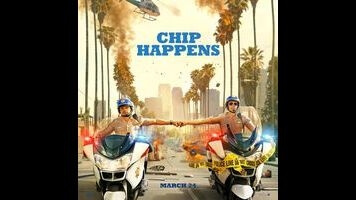Frank “Ponch” Poncherello, the undercover FBI agent tasked with investigating corruption in the California Highway Patrol as portrayed by Michael Peña in the new action-comedy CHIPS, is heterosexual. Normally, that isn’t something that would be deemed important enough to note in the opening paragraph of a review. But this movie, loosely based on the late ’70s-early ’80s NBC cop show starring Larry Wilcox and Erik Estrada and blatantly emulating the 2012 movie adaptation of 21 Jump Street, seems to think it’s really, really important for audiences to know that Ponch is not a homosexual.
He’s so straight, in fact, that he gets defensive and angry when he’s greeted by a man in his underwear, even if they happen to be in a locker room at the time. As Ponch explains it, it’s not homophobic to have a phobia of another man’s body, as long as the dude whose dickprint is squicking you out also isn’t gay. Hate to break it to you, Ponch, but internalized homophobia is still homophobia. And this movie relies so heavily on tired gay panic tropes, it’s almost a relief when it changes tacks for an extended riff on how hilarious it is to make out with ugly chicks. Almost.
The disappointing part is that this accidental treatise on fragile masculinity was written and directed by Dax Shepard, whose public persona is that of a nice, if kind of goofy, guy. As mentioned above, Shepard appears to be attempting to revitalize the CHIPs brand by giving it the irreverent, R-rated 21 Jump Street treatment, except that he’s not as clever about it as Phil Lord and Christopher Miller were with that film. Instead, he fills the void with running gags involving cat shit and anilingus, along with all the guns, tits, and F-bombs an overgrown 14-year-old could ask for.
A 14-year-old boy, of course: Women don’t get much thought in this film, although it technically passes the Bechdel test because a group of female Highway Patrol officers talk about how much prettier one of them is than the rest. The rest of the time, women either exist to prop up their male counterparts’ egos by sending them naked photos (except if they’re old, gross lol), or to destroy them by cuckolding them. That latter role is filled by Shepard’s real-life wife, Kristen Bell, who must love her husband very much to agree to play the ball-busting stereotype she portrays in this film.
To back up a second: Bell’s character’s cruelty is, at least partially, how we all got ourselves into this mess in the first place. You see, she’s married to Jon Baker (Shepard), a washed-up former professional motorcycle racer whose many injuries have left him in chronic pain and unable to compete. So Jon is embarking on a career in law enforcement to impress his estranged wife; we know this is his motivation, because he repeats the phrase “save my marriage” approximately every 10 minutes. Shepard actually lets himself largely off the hook here, playing Jon as a sensitive West Coast guy whose vocabulary and interpersonal skills are heavily influenced by his experiences in therapy. (Of course, given this movie’s macho worldview, that’s also why his wife is cheating on him.)
The main thrust of the plot is that Jon is paired up with cocky ladies’ man Ponch (Peña) after Ponch is sent from Miami to Los Angeles to investigate rampant corruption in the California Highway Patrol. (Not only are they corrupt, they’re incompetent as well: After being told that a slain suspect was unidentifiable due to his injuries, Jon recognizes him from a crime scene photograph.) After an initial period of bickering/bonding, the two have a major fight—Ponch can’t even look at titty pics on his phone, he’s so sad—that leads Ponch to reveal his secret to his partner.
From then on, the two give up the pretense of maintaining anything resembling a cover as they buy themselves Ducatis and embark on their investigation of/meddling into the case of a Highway Patrol lieutenant (Vincent D’Onofrio) who’s gotten himself caught up in the black-market art trade in the hopes of getting his druggie son off of heroin. (It doesn’t make a whole lot of sense in context, either.) From there, the action gets graphically violent quite quickly, an admittedly common trait of the modern action-comedy that nevertheless adds a needlessly mean-spirited touch to this particular film’s already uncouth comedic sensibility.
Not all is shaky camerawork and self-conscious edginess, however. Some of the motorcycle chase scenes—of which there are plenty—serve as a pleasant street-level tour of L.A. Brief appearances from the likes of Maya Rudolph, Mae Whitman, Alan Alda, and, of course, Erik Estrada are all good for a bit of fun. Toto and Black Sabbath appear prominently on the classic rock-heavy soundtrack. A handful of the jokes are even kind of funny. But bloodshed and dick-waggling alone are not enough to carry an effective contemporary update, and given the alternative between the big-screen CHIPS and an antiquated, low-stakes episode of the original TV series, we’d pick the latter in a heartbeat.


 Keep scrolling for more great stories.
Keep scrolling for more great stories.